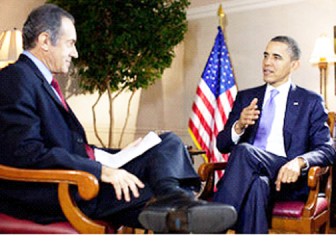SAN SALVADOR, El Salvador — For a man who prides himself on having taken “unprecedented steps” to try to ease five-decade-old US tensions with Cuba, President Barack Obama did not look eager to make new gestures toward the Cuban military regime when I interviewed him Tuesday.
The ball is in your court, he seemed to be telling Cuba.

“We have expanded remittances, we expanded travel, we have sent a strong signal to the Cuban people,” Obama said. “The Cuban government made some gestures about releasing political prisoners and starting some market-based economies with small business opportunities. (But) we haven’t seen as much follow-through as we would like.”
Obama said that Cuban authorities must take some “meaningful actions,” but was not specific when I asked what would be the minimum measures Cuba should take to improve bilateral ties.
Obama did not mention the case of Alan Gross, the US contractor who was sentenced to 15 years in prison this month for taking telephone equipment to Cuba, but other US officials have asked for his immediate release in recent days.
On the pending US free trade deals with Colombia and Panama, I asked Obama whether he sees a better than 50 per cent chance that he will send them to Congress for a vote this year.
“I won’t put a number on it, but I am very interested in getting those deals done,” he said.

But this year? I insisted. Republicans are accusing Obama of dragging his feet on both deals because of resistance from US labour unions whose support Obama will need to be re-elected next year.
“I am sending my team to Colombia and Panama to see how we can quickly resolve any final differences before we put them to Congress,” he said.
This year? I insisted once again.
“Whenever you put a timetable, people complain if it happens even a week after your deadline, so I try to avoid those numbers,” he said.
My translation: Obama is not ready to spend much political capital on the two pending free trade deals with Latin America, at least not yet. And if he doesn’t do it this year, it’s not likely to happen during an election year in 2012.
On reports that Venezuela is secretly helping Iran obtain uranium in violation of United Nations Security Council resolutions aimed at stopping Iran’s nuclear weapons programme, I asked Obama whether he is concerned about this issue, and to what extent.
“We take non-proliferation very seriously,” Obama said. “I wouldn’t make categorical statements to you about these issues, but we are concerned that international law, international resolutions, are observed, and we want to make sure that they are observed.”
My translation: Obama has been told by his top aides that recent allegations by top Republicans in Congress that Venezuela actively is helping Iran circumvent UN sanctions for its nuclear programme are politically-motivated, and that there is no smoking gun yet tying Venezuela to Iran’s nuclear weapons programme.
On the recent US diplomatic row with Argentina over the South American government’s decision to seize equipment from a US Air Force cargo plane that had landed there for a joint exercise, I asked Obama whether his White House spokesman had over-reacted when he described the incident as “serious,” and whether the whole issue has already been solved.
“No,” Obama responded. “It is serious in the sense that Argentina historically has been a friend and a partner of the United States. They have some of our communications equipment.
There is no reason not to return it. And next time I see President (Cristina Fernández de) Kirchner, I will mention, ‘Can we get our equipment back?’ But it’s not going to be a defining aspect of the US-Argentine relationship.”
My translation: Obama sees the Argentine government’s decision to seize the US equipment as a gross electoral propaganda move by Fernández de Kirchner’s government to capitalize on anti-American sentiment in that country in anticipation of this year’s presidential elections.
In my next column, Obama’s responses to my questions about his claims that he is starting “a new era of partnership” with Latin America, and his views about what the United States and Latin America should do to improve their education levels and become more competitive with China and other Asian countries
© The Miami Herald, 2011. Distributed by Knight Ridder/Tribune Media Services.




